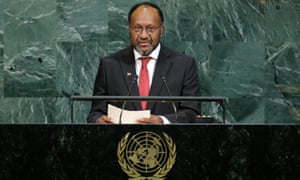(Excerpt from)
"Disaster risk reduction
51. We recognize that small island developing States continue to grapple with the effects of disasters, some of which have increased in intensity and some of which have been exacerbated by climate change, which impede their progress towards sustainable development. We also recognize that disasters can disproportionately affect small island developing States and that there is a critical need to build resilience, strengthen monitoring and prevention, reduce vulnerability, raise awareness and increase preparedness to respond to and recover from disasters.
52. In consideration of the special case of small island developing States and their unique and particular vulnerabilities, we are committed to supporting their efforts:
(a) To gain access to technical assistance and financing for early warning
systems, disaster risk reduction and post-disaster response and recovery, risk
assessment and data, land use and planning, observation equipment, disaster
preparedness and recovery education programmes, including under the Global
Framework for Climate Services, and disaster risk management;
(b) To promote cooperation and investment in disaster risk management in
the public and private sectors;
(c) To strengthen and support contingency planning and provisions for
disaster preparedness and response, emergency relief and population evacuation, in particular for people in vulnerable situations, women and girls, displaced persons, children, older persons and persons with disabilities;
(d) To implement the Hyogo Framework for Action 23 and work for an
ambitious renewed international framework for post-2015 disaster risk reduction
that builds on previous achievements, prioritizes prevention and mitigation and
incorporates implementation frameworks to address implementation gaps if and
when they exist;
(e) To mainstream policies and programmes related to disaster risk
reduction, climate change adaptation and development, as appropriate;
(f) To harmonize national and regional reporting systems, where applicable,
to increase synergies and coherence;
(g) To establish and strengthen risk insurance facilities at the national and
regional levels and place disaster risk management and building resilience at the
centre of policies and strategies, where applicable;
(h) To increase participation in international and regional disaster risk
reduction initiatives."
______________________________________________________________________________
U.N. DEVELOPMENT PROGRAMME PROVIDES
RELIEF/RECOVERY HELP
UNDP is also working closely with national authorities in Turks and Caicos, St. Martin and Bahamas to provide support and immediate and long-term recovery measures.

32 million people in the Caribbean live in areas exposed to high-speed wind zones (excess of 60km/h). Photo: UNDP Haiti
New York – The most powerful hurricane ever recorded over the Atlantic Ocean has battered several Caribbean islands, leaving Barbuda and St. Martins near “uninhabitable”, according to national authorities. Hurricane Irma has also left catastrophic damage as it passed over Turks and Caicos, southern Bahamas, northern Dominican Republic and northern Haiti.
To help countries and communities respond, the UN Development Programme (UNDP) has immediately made available US$300,000 from its core resources to support assessments, coordination and recovery planning in Irma-affected countries.
Ahead of the Hurricane UNDP deployed crisis response experts to several Caribbean countries, including Jamaica and Haiti, where nine UNDP staff members are supporting crisis coordination in impacted communities in the north. UNDP is also working closely with national authorities in Turks and Caicos, St. Martin and Bahamas to provide support and immediate and long-term recovery measures.
Across the impacted countries, housing, community infrastructure and the livelihoods of millions of people have been severely damaged.
“In the wake of such disasters those who own so little are the hardest hit,” said UN Assistant Secretary-General and UNDP Regional Director for Latin America and the Caribbean Jessica Faieta. “In addition to the terrible casualties, they lose their houses, their small businesses, their boats, their livelihoods. Now is the time to help Irma-affected people get back on their feet.”
To help women, men and children rebuild their lives, after Irma’s devastation UNDP has activated an online donations platform.
https://Give.undp.org/Irma
Caribbean vulnerability in numbers
- 32 million people in the Caribbean living in areas exposed to high-speed wind zones (excess of 60km/h)
- 2 million people in the Caribbean living in areas exposed to extreme high-speed wind zones (excess of 120km/h)
- 13 people reported dead across affected territories
- 3 hurricanes currently active in the Atlantic Ocean: Irma and Jose over the Caribbean, and Katia in the Gulf of Mexico




